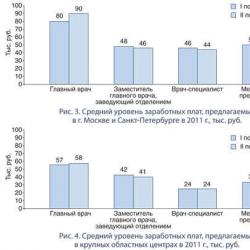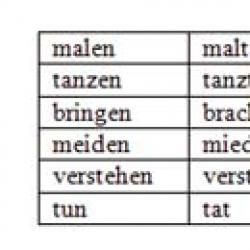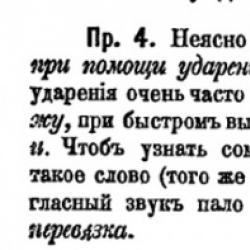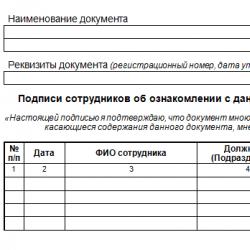Journal of familiarization with local regulations. Journal of familiarization with local regulations (sample) Journal of familiarization with local regulations of the institution
The log of familiarization with local regulations is an internal document of the organization; it is not mandatory, but its use will help the employer comply with the requirements of the Labor Code, according to which it is necessary to familiarize employees with internal regulations.
Why do you need a log of familiarization with local regulations?
Norms Art. 68 Labor Code of the Russian Federation the employer is required to familiarize the company's employees with all local regulations (LNA) that are related to his work activities. Such familiarization must necessarily take place against the signature of the employee. Ignoring this requirement entails administrative liability for failure to comply with the requirements of labor legislation. No one wants to pay fines, so the familiarization process has to be formalized somehow. There are several ways to do this:
- draw up separate familiarization sheets and attach them to all Regulations, orders, contracts and other documents;
- put paintings directly on the LNA;
- start a special journal.
Orders for hiring, leave, dismissal and other personalized personnel documents are usually introduced “under signature” - with the receipt of a person’s confirming signature on the document itself. But with internal regulations that affect many people at once, the situation is more complicated, because if every person directly signs for them, there will be no free space left very quickly. Therefore, employers either create special additional sheets for signatures (which is inconvenient), or create one magazine for familiarizing employees with LNA. At the same time, in a large company with various departments and other structural units, where there is a constant movement of personnel, it is possible to issue such a book-type form separately both for each type of document and for departments or branches. Then all local acts will be in order and there will be no need to attach additional sheets to them.
Sample log of familiarization with local regulations
There is no approved form for such a journal. Since it is not mandatory or even recommended, legislators have ignored it. The introduction of this form into the organization’s document flow is aimed solely at simplifying the implementation of the requirements of the Labor Code of the Russian Federation and other laws. Therefore, it depends only on the employer how exactly he will resolve this issue. You will have to develop the necessary form yourself. The main thing is that it contains all local regulations that new employees should become familiar with. The generated form must be approved by order of the head of the organization.
There shouldn’t be anything difficult about filling out such a document. For example, it might look like this:
It is also not necessary to give it book form. These can also be individual sheets placed in a binder folder. There is no need to put any approval stamps on the title page, you can only put the start and end date of the entries.
Structure of the journal and its storage period
From the above example you can see that the log form is quite simple. Since there are usually many LNAs that must be introduced to organizations, it is necessary to allocate several pages for each of them. In this case, the structure of these pages will not differ and will contain the following columns:
- employee details (full name);
- position and department in the organization;
- date of approval (time, if necessary);
- personal signature of each employee.
If desired, the sheets can be numbered and stitched, but this is not necessary. The person responsible for maintaining such a journal is usually a human resources specialist or the manager himself, if the organization is small.
Separately, it is necessary to note the procedure and terms of storage of this document. This issue is also not regulated by law, so it must be determined by the organization itself. Most often, employers want to make it short, for example 5 years. This is a mistake, and in practice it is better to set longer shelf life. After all, many local acts have a permanent shelf life or are stored for at least 10 years. It is advisable that these periods do not differ from the period of storage of documents on familiarization with them. In addition, employees who were familiar with the LNA more than 5 years ago can continue to work in this organization and raise the issue of familiarizing them with certain standards. Without this document, it will be quite difficult to prove that the requirements were met.
Also, one should not forget about Order of the Ministry of Culture of the Russian Federation dated August 25, 2010 N 558, which directly states that all local regulations (regulations, instructions) on personal data of employees are documents of permanent storage. Therefore, it is advisable to establish the same requirements for the review log if it concerns personal data. In particular, you should always store local documents such as:
- Regulations on the structural divisions of the organization;
- Regulations on wages.
Therefore, if employees sign and get acquainted with these LNAs personally, the shelf life of the form confirming this fact should be similar.
– used to collect signatures from employees confirming familiarization with local regulations.
When hiring (before signing an employment contract), the employer is obliged familiarize the employee with signature with internal labor regulations, other local regulations directly related to the employee’s work activity, and a collective agreement.
(Labor Code of the Russian Federation, Part III, Art. 68)
ABOUT composition of local regulations mandatory for every organization, the Labor Code of the Russian Federation states:
- When concluding employment contracts, HR specialists should, whenever possible, be guided by the names of positions, specialties, professions (indicating qualifications) included in staffing table organizations (Article 57 of the Labor Code of the Russian Federation);
- Having concluded an employment contract with the employer, the employee is obliged to comply with the rules in force in the organization internal labor regulations(Article 56,189,190 of the Labor Code of the Russian Federation);
- employees of the organization must be familiar with the documents establishing procedure for processing personal data workers, as well as about their rights and obligations in this area (clause 8 of Article 86 of the Labor Code of the Russian Federation);
- during shift work, each group of workers must work within the established working hours in accordance with shift schedule(Article 103 of the Labor Code of the Russian Federation);
- The order of granting paid leave is determined annually in accordance with vacation schedule(Article 123 of the Labor Code of the Russian Federation).
Along with the local regulations directly provided for by the Labor Code of the Russian Federation, the employer, carrying out local rule-making, can adopt other documents containing labor law norms necessary to solve emerging problems in relations with employees.
View of the main section of the magazine:

According to GOST 31282-2004 control seal- a unique single-use indicator device designed to detect unauthorized access.

Before starting to work with the Journal, you must fill out the title page and certification. Be sure to enter the seal number in the appropriate line; without this, the Journal is not considered sealed.
Regulatory materials:
What are the requirements for personnel logbooks and how the logbook should be designed in accordance with these requirements, see our video.
Helpful information:
“In the event of an inspection by the State Labor Inspectorate, how can we confirm that the employee is familiar with local regulations before signing the employment contract, and not after that?”
According to Part 3 of Art. 68 of the Labor Code of the Russian Federation, when hiring (before signing an employment contract), the employer is obliged to familiarize the employee, against signature, with the internal labor regulations, other local regulations directly related to the employee’s work, and the collective agreement. The job description, as a rule, is also a local regulatory act of the employer (in rare cases, it is an annex to the employment contract).
Some employees, after applying for a job, begin to be indignant that when they signed the employment contract they were counting on different working conditions, working hours, payment, a different composition and scope of duties, rights and responsibilities, that, knowing “everything”, they would not have applied for the job . It happens that after signing an employment contract, an employee no longer wants to sign local regulations and comply with them. To avoid unnecessary dissatisfaction and disputes, it is possible to familiarize the employee with exactly before signing with him an employment contract with the conditions established in the local regulations of the employer, the collective agreement.
The procedure for familiarizing yourself with local regulations is not defined by the Labor Code of the Russian Federation; in practice, there are various options:
Maintaining familiarization magazines with local regulations, in which employees put signatures confirming familiarization and indicate the dates of familiarization,
Familiarization sheets are attached to the local regulatory act, on which employees put signatures confirming familiarization and the dates of familiarization (such sheets are stitched together with the local regulatory act).
When hiring an employee, the text of the employment contract may include a phrase stating that the employee, before signing the employment contract, is familiar with the local regulations of the employer, and these acts are listed.
As a rule, both magazines and familiarization sheets contain a column “Date of familiarization of the employee with the local regulatory act.” Some personnel specialists, when familiarizing an employee with local regulations, ask him to indicate not only the date, but also the time of familiarization (the column in the magazine or familiarization sheet is already called “Date and time of familiarization of the employee with the local regulations”), thus emphasizing compliance with the code’s requirement to that the employee must, before signing an employment contract, be familiar with the employer’s local regulations directly related to the employee’s work activity.
Accordingly, when signing an employment contract, the employee is asked to set the time. We do not object to such diligence, but we believe that it will be sufficient, when familiarizing an employee with the local regulations of the employer, to set a date of familiarization, and to include in the employment contract a phrase stating that the employee has become familiar with the local regulations of the employer (with a listing of these acts) before signing the employment contract ).
A certain procedure for familiarizing yourself with local regulations may be enshrined in the act itself. Before familiarizing an employee with local regulations, you need to find out the familiarization procedure existing at your employer. It is important that the established procedure does not contradict the law. So, if you have established that employees are familiarized with local regulations orally or by posting them on a stand, then this procedure contradicts the requirement of Art. 67 of the Labor Code of the Russian Federation on familiarization of employees with signature with local regulations of the employer, therefore it is not legal.
Documentation is an important element in the work of any organization. Every process and every decision is recorded in the form of a corresponding document. An employee is faced with them even before signing an employment contract, since at the interview stage he is given the opportunity to familiarize himself with the local regulations of the institution in which he plans to work. After studying, the future employee signs in the LNA familiarization log.
From this article you will learn:
- why is this magazine needed?
- appearance of the journal for familiarization with local regulations;
- filling out a log of familiarization with LNA.
Why is this magazine needed?
This journal is necessary so that the employer or inspector from the labor inspectorate can make sure at any time that each employee has familiarized himself with the number of documents that are required according to his position and/or the work performed. In the event of a violation and/or accident due to the fault of an employee, the employer may provide the commission investigating the case with a log of familiarization with local regulations, which will indicate that the employee was informed with appropriate documentation about the rules of work, routines and other mandatory things.
The required minimum that must be displayed in the log includes:
- staffing schedule of the institution (Article 57 of the Labor Code of the Russian Federation);
- internal labor regulations (Article 56, Article 189 and Article 190 of the Labor Code of the Russian Federation);
- documents establishing the procedure for processing personal data (clause 8 of article 86 of the Labor Code of the Russian Federation);
- orders on the application of disciplinary sanctions (Article 193 of the Labor Code of the Russian Federation);
- shift schedule (Article 103 of the Labor Code of the Russian Federation);
- regulations on labor protection (Article 212 of the Labor Code of the Russian Federation);
- regulations on remuneration (Article 135 of the Labor Code of the Russian Federation);
- vacation schedule (Article 123).
Appearance of the magazine for familiarization with local regulations
The internal block of the journal contains tables developed and approved for each type of journal individually, and information about the persons responsible for filling them out. This information includes:
- last name, first name and patronymic of the responsible person;
- period of liability;
- document according to which the person responsible is appointed;
- signature of the most responsible person.
Filling out a log of familiarization with local regulations
The journal is filled out by the employee appointed responsible for filling it out by the relevant order of the manager. This order and information about the responsible person are also indicated in the journal. When starting a new journal, the start date of record keeping is indicated on the title page.
An organization may have a journal with a table approved by a legislative document, or it may develop it independently. The required elements of the table are:
- serial number;
- last name, first name and patronymic of the employee;
- his position;
- name of the structural unit in which the employee works;
- the name of the local regulatory act with which the employee is introduced;
- signature of the employee indicating familiarization;
- date of signing.
The journal is filled out as documents are approved and employees become familiar with them. If an employee works remotely, he can be familiarized with LNA directly related to his work by exchanging with him electronic documents with an electronic digital signature (Part 5 of Article 312.1, Part 5 of Article 312.2 of the Labor Code of the Russian Federation, Article 6 of the Federal Law of 04/06/2011 No. 63-FZ “On Electronic Signature”). The employer is obliged to control the employees' study (under signature) of adopted local regulations, therefore, according to Part 2 of Article 22 of the Labor Code of the Russian Federation, in case of failure to comply with this obligation, the employer will be held administratively liable under Article 5.27 of the Code of Administrative Offenses of the Russian Federation in the form of an administrative fine:
- officials - in the amount of 1000 to 5000 rubles;
- legal entities - from 30,000 to 50,000 rubles and/or suspension of the organization’s work for up to 90 days.
Attached files
- Logbook for acquaintance with local regulations of the organization (sample).doc
- Order on approval of a new edition of a local document (sample).doc
Available to subscribers only
- Logbook for acquaintance with local regulations of the organization (form).doc
- Order on approval of a new edition of a local document (form).doc
Return back to
Journal of registration of local regulations - used to register regulations developed and approved in the organization (local regulations).
Local regulations are acts of the employer that contain rules of conduct that are mandatory for an indefinite number of persons and are designed for repeated use. Local regulations establish the order of organization and working conditions, characterize the labor management system as a whole, for all employees of the organization.
Labor legislation gives employers the right to adopt local regulations containing labor law norms, within their competence, in accordance with labor legislation and other regulatory legal acts containing labor law norms, collective agreements, and agreements (Article 8 of the Labor Code of the Russian Federation).
The composition of local regulations mandatory for each organization is stated in the Labor Code of the Russian Federation:
When concluding employment contracts, HR specialists should, whenever possible, be guided by the names of positions, specialties, professions (indicating qualifications) included in the organization’s staffing table (Article 57 of the Labor Code of the Russian Federation);
Having concluded an employment contract with the employer, the employee is obliged to comply with the internal labor regulations in force in the organization (Article 56,189,190 of the Labor Code of the Russian Federation);
Employees of the organization must be familiarized with the documents establishing the procedure for processing personal data of employees, as well as their rights and obligations in this area (clause 8 of Article 86 of the Labor Code of the Russian Federation);
during shift work, each group of workers must work during the established working hours in accordance with the shift schedule (Article 103 of the Labor Code of the Russian Federation);
The order of provision of paid vacations is determined annually in accordance with the vacation schedule (Article 123 of the Labor Code of the Russian Federation).
Along with the local regulations directly provided for by the Labor Code of the Russian Federation, the employer, carrying out local rule-making, can adopt other documents containing labor law norms necessary to solve emerging problems in relations with employees.
When hiring (before signing an employment contract), the employer is obliged to familiarize the employee, against signature, with the internal labor regulations, other local regulations directly related to the employee’s work activity, and the collective agreement.
The development of local regulations should be carried out taking into account the following requirements:
Local regulations regulating the regime and working conditions are adopted by the employer taking into account the opinion of the representative body of employees (Articles 103,123,135,144,162,190 of the Labor Code of the Russian Federation);
the staffing table, regulations on structural divisions, job descriptions are adopted by the employer alone;
other local regulations (for example, personnel regulations) can be adopted taking into account the opinion of the representative body of workers, which is preferable to their individual adoption, since this indicates the participation of workers and their representatives in the management of the organization and the development of forms of social partnership (Article 27 of the Labor Code RF).
A feature of some local regulations is their inclusion by the State Statistics Committee of Russia in the unified forms of primary accounting documentation for labor accounting and payment. Such documents include the staffing schedule (Form T-3) and the vacation schedule (Form T-7).
Some types of local regulations
Required documents:
Staffing table (Form T-3);
Internal labor regulations;
Regulations on the protection of personal data;
Induction program;
Regulations on labor protection.
Documents that become mandatory under certain circumstances:
A collective agreement is mandatory if at least one of the parties (employees or employer) took the initiative to conclude it.
The provision on remuneration and bonuses is mandatory if some of the terms of remuneration and bonuses that apply to the employer are not regulated in any other document, for example, neither in an employment contract, nor in the staffing table.
Job descriptions are mandatory if all job responsibilities of employees are not regulated in employment contracts.
The regulations on certification and documents accompanying certification are mandatory if the employer carries out certification of employees.
Shift schedule is required if there is shift work.
The provision on trade secrets is mandatory if the employment contract states that the employee is obliged to maintain a trade secret.
And etc.
Registration is a record of accounting data about a document in a prescribed form, recording the fact of its creation, sending or receipt.
Registration is confirmation of the creation or receipt of a document at a certain time (day) by entering it into the registration form, assigning a number and recording basic data about the document. As follows from the definition, registration, first of all, gives legal force to the document, because records the fact of its creation or receipt. Until the document is registered, has not received its number, it is not formalized and does not seem to exist yet.
![]()
Journal of familiarization with local regulations - sample can be downloaded from the link in the article. In addition, the publication contains information on how the journal is filled out and recommendations for structuring information.
Journal of familiarization of employees with local regulations: general provisions
By virtue of Art. 22 of the Labor Code of the Russian Federation, the employer has the right to issue local acts. He is obliged to familiarize all employees affected by such acts with them. Workers hired must also familiarize themselves with the provisions of local acts that were issued in the organization, in accordance with Part 3 of Art. 68 Labor Code of the Russian Federation.
In order for the employer to prove that employees have familiarized themselves with local documentation, it is necessary to record information about this in writing.
Important! If during the inspection the employer cannot prove compliance with the requirements of the Labor Code of the Russian Federation regarding the need to familiarize employees with local documents, he will be held liable under Part 1 of Art. 5.27 of the Code of Administrative Offenses of the Russian Federation, which provides for punishment in the form of a fine (up to 5,000 rubles for officials and up to 50,000 rubles for legal entities).
One of the most convenient ways to record information about workers’ familiarization with local acts is to enter them in a special journal. Any personnel employee or accounting employee can be appointed responsible for maintaining and filling out the journal.
The form of the journal is not legally established. It can be approved by a local act of the head of the organization. Let's consider what information should be reflected in the journal and how to structure it.
Information to be entered into the journal. How to structure the information contained in the journal?
For convenience, the journal should be filled out in the form of a table. The following columns must be entered into it:
- Serial number of the record.
- FULL NAME. employees who become familiar with the acts.
- Information about the employee’s position and the structural unit in which he performs duties.
- Date of review of local documentation.
- Employee's signature.
You can add a separate column to the journal that contains information about which local acts were reviewed, but it is much easier to separately indicate that all local documentation approved by the organization is being reviewed.
You can structure information in different ways. If there are not many employees, it is enough to indicate the serial numbers of the records. If the staff is large, you can sort it either alphabetically or by position.
Sample log for familiarizing employees with local regulations
A sample log might look like this:
Approved by Order
Director of VegaPlus LLC
Idrisov O.P.
No. 176-zh dated May 11, 2005
Journal of familiarization with local regulations
| Item no. | Full Name | Position, structural unit | Date of review | Signature |
| 1 | Sukharev Ivan Nikitovich | Senior foreman | 18.05.2017 | Sukharev |
| 2 | Kryzhikov Oleg Gavrilovich | Junior foreman | 13.04.2016 | Kryzhikov |
| 3 | Irisov Ilnur Nikolaevich | Legal consultant | 15.09.2016 | Irisov |
| 4 | Genrov Robert Robertovich | Cook | 17.06.2015 | Genrov |
| 5 | Avzeev Rinoslav Anufrievich | Baker | 12.03.2017 | Avzeev |
| 6 | Ershov Sergey Semenovich | Confectioner | 16.08.2016 | Ershov |
| 7 | Eltsov Alexander Sergeevich | Security guard | 13.09.2015 | Eltsov |
| 8 | Avishcheva Irina Semenovna | Marketer | 18.07.2016 | Avishcheva |
| 9 | Nekrasova Yulia Igorevna | Manager | 13.02.2017 | Nekrasova |
| 10 | Yurieva Anna Germanovna | Watchman | 15.02.2017 | Yuryeva |
Thus, creating a journal is quite simple. Its form can be approved by a local act of the head of the company. In addition, a person appointed by order of the director may be responsible for maintaining the document.





